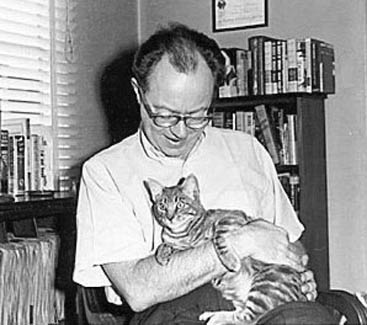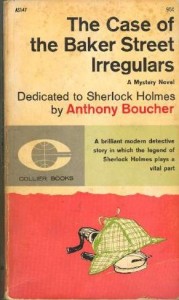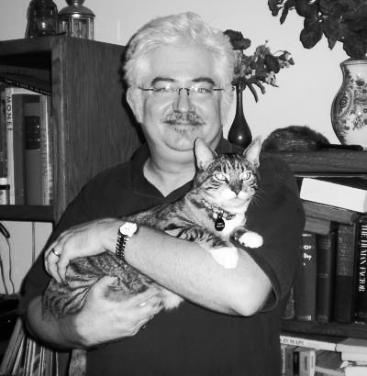Monday, October 6: The Scribbler
TONY & ME
by James Lincoln Warren
 Before heading off to Bouchercon, I thought I would share a few thoughts concerning a man I never met: William Anthony Parker White, a.k.a. Anthony Boucher. My first awareness of him was when I was in high school in the early 70s. I had just joined the Science Fiction Book Club and received their two-volume A Treasury of Great Science Fiction for the cost of a dime.
Before heading off to Bouchercon, I thought I would share a few thoughts concerning a man I never met: William Anthony Parker White, a.k.a. Anthony Boucher. My first awareness of him was when I was in high school in the early 70s. I had just joined the Science Fiction Book Club and received their two-volume A Treasury of Great Science Fiction for the cost of a dime.
When the books arrived in the mail, my mother, who was categorically not a science fiction reader, said, “I’ll bet these are good. They were edited by Anthony Boucher.”
“Who’s he?”
“A very fine critic and editor. He also writes mysteries.”
Mom’s preferred leisure reading were usually mysteries (especially Agatha Christie, Dorothy L. Sayers, and Margery Allingham) and suspense novels (Helen MacInnes and Mary Stewart were favorites). She also frequently read classics (when she and Dad came to visit me in California in the late 80s, the book she toted around for bedtime reading was Silas Marner) and enjoyed a good A. J. Cronin saga now and again. Mom was very intelligent, although I wouldn’t call her tastes particularly cerebral. But she did have an unerring eye for quality.
 I don’t know where she first encountered Boucher’s name, but my guess is from one of his novels, The Case of the Baker Street Irregulars, which after her death I found tucked away on one of her bookshelves. Its presence there was a little curious because Mom wasn’t really a Sherlockian at all — but her reading could cast a wide net. I had never read any of Boucher’s fiction, so I took it with me back to L.A.
I don’t know where she first encountered Boucher’s name, but my guess is from one of his novels, The Case of the Baker Street Irregulars, which after her death I found tucked away on one of her bookshelves. Its presence there was a little curious because Mom wasn’t really a Sherlockian at all — but her reading could cast a wide net. I had never read any of Boucher’s fiction, so I took it with me back to L.A.
To call it delightful is a pale understate- ment. The book has no flaws, but its greatest strength is its distinctive literary tone: sophisticated without being remotely pretentious. In many ways, it reminded me of Cathleen Jordan’s only novel, A Carol in the Dark. (Cathleen, of course, was a prominent editor herself for many years at the helm of Alfred Hitchcock’s Mystery Magazine.) I guess you could call it playfully erudite.
That is a quality I aspire to in much of my own fiction. I think it is a particular quality of traditional mysteries — Harriet’s and Lord Peter’s literary badinage, Albert Campion’s recondite blather, Nero Wolfe’s orchidean expertise (which avocation he shared with Ian Fleming’s M, by the way) — but I can’t think of any writer who pulled it off as charmingly as Boucher did. Contemporary crime fiction has become so self-conscious- ly gritty that all too often it’s like so much unrinsed raw spinach. It has coarsened our expectations in what we consume. We’ve forgotten how much fun being refined can be. There are exceptions, of course, the most obvious of which is the late Sarah Caudwell, but she’s been gone now for eight years. We certainly don’t have a Tony Boucher among our ranks.
My primary goal at Bouchercon this week is to thoroughly enjoy the wonderful company I will find myself among — buddies like Charles Todd and Elaine Flinn, colleagues like John and Leigh and Steve and Melodie, and of course all the fabulous fans and writers I have yet to meet.
and Elaine Flinn, colleagues like John and Leigh and Steve and Melodie, and of course all the fabulous fans and writers I have yet to meet.
And one ghost. At some point during the week, I expect to raise a glass to the spiritual founder of the feast.
I may even try to say something playfully erudite.
“Diction City Police Dept.” Dept.
We all have our verbal pet peeves, but lately one has been driving me around the bend, especially when spouted by ignorant television reporters. I don’t mean the gross misuse of “ironic” to mean “coincidental” or the ubiquitous and wrongful application of “iconic” to mean “epitome”, even though those, too, drive me nuts.
No, I refer to the nearly universal mispronunciation of the adjective “short-lived” with a short “i” instead of a long “i”. This is completely wrong. I know why this is. It is because the verb “to live” is pronounced with a short “i”, and the past tense of the verb and the adjective are spelled exactly the same way. Danger, Will Robinson! (Non-boomers are forgiven for not catching this once-upon-a-time hip cultural reference to a bad TV show.)
Leigh has already educated us about words that are spelled identically but pronounced differently. This is a case in point.
You would never say “short-saw” to describe someone who is “short-sighted”, would you? To be “short-lived” means to have a short life. For whatever reason, “short-lifed” never made it into the lexicon, whereas “short-lived”, with the voiced consonant, did. But “short-lived” rhymes with “survived”, something its correct pronunciation is obviously having trouble with.
So now is the time to stand up and be counted, mi amigos. Whenever you hear someone performing this barbarism, gently admonish them and let them know how it should be pronounced. You will do them a favor, improve both your own and their karma, and savor the rare and precious experience of guilt-free, 100% justified smugness — all at once. It just doesn’t get any better than that.




















Good for you, JLW — I am DELIGHTED to hear that someone else hates the mispronunciation of short-lived. I’m always telling people the way it should be pronounced, and nobody seems to give a damn. In fact they do a lot of eyerolling every time I mention it.
One of my favorite pet peeves.
You sir, with all due respect, could use a little correcting yourself. The Spanish you used, “mi amigos,” has mixed a singular possessive adjective with a pleural noun — a no, no in most romance languages. The phrase you need is “mis amigos.”
Oh, damn.
Whew! I would have mis’ed that one, too. I confess that I’m half-guilty– I probably mispronounce lived half the time– or mispronounced (past tense), since I vow to do better. I think it has something to do with “Long live the king,” which falls too easily into “The king is long-lived.”
James, was A Treasury of Great Science Fiction‘s jacket black and white with a red rocket? I had the same thing and yes, I think I spent 10¢ on it too. It might have been the best dime I ever spent.
Have a great Bouchercon, James, and all of the rest of you who are off to the party.
… was A Treasury of Great Science Fiction’s jacket black and white with a red rocket?
That’s the one.
My two favorite mispronounced words are “forte” and “coupé.” The first one, meaning a particular strength or talent, is intended to be pronounced the same as “fort.” The second one, as in the Beach Boys’ little deuce, is supposed to be pronounced “koo-pay,” although the only time I hear is said that way is in old movies or radio programs.
Bouchercon is another word that is often mispronounced, usually with the first syllable uttered as “boo” and sometimes with the “c” in the final syllable dropped.
The great Ed Hoch was very graceful when his surname name was said incorrectly. (“Hoch” rhymes with “Coke,” and not with “crotch”).
How’s that, mon amis?
Considering how poor Boucher’s health was all his life it’s amazing he was able to do as much as he did! Look around and you may be able to find “Exeunt Murderers” which collects some of his short mysteries, and “The Compleat Boucher” which has most of his sf/fantasy stories, including a few science-fictional mysteries. Have fun at Bouchercon! Cheers!
I wish I could be at Bouchercon this year. My new biography of Anthony Boucher (appropriately entitled Anthony Boucher) is just out from McFarland.
Actually though, I’ll be talking to a Baker Street Irregulars group that night. It should be fun!!
>How’s that, mon amis?
mon ami….mes amis
Dear Mr. Marks: I hope to read it! I loved “Who Was That Lady?” Boucher’s work in spite of everything, is simply inspiring.
Sheena, glad you corrected me!
Rob, I’ll be thinking of you when I’m at B’con. But I know you’re going to be someplace more important!
Jeff, sorry you won’t be at B’con. I just read your Boucher book and enjoyed it very much. I have fond memories of seeing Phyllis at Bouchercon, year after year. And I remember a distinct sense of loss at the first Bouchercon after her death.